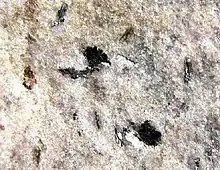| Nezhilovite | |
|---|---|
 Nezilovite | |
| General | |
| Category | Mineral |
| Formula (repeating unit) | PbZn2(Mn4+,Ti4+)2Fe8O19 |
| Strunz classification | 4.CC.45 |
| Crystal system | Hexagonal |
| Space group | P63/mmc |
| Unit cell | a = 5.849 Å, c = 22.809 Å Z=2 |
| Identification | |
| Colour | black |
| Luster | metallic |
| Streak | dark brown |
| Diaphaneity | opaque |
| Specific gravity | 5.69 |
| Optical properties | Uniaxial (-) |
| Pleochroism | no |
Nezhilovite is a magnetoplumbite mineral discovered in 1996 by Bermanec et al.,[1] who gave it the ideal elemental formula PbZn2(Mn4+, Ti4+)2Fe8O19. It forms black magnetic crystals up to 1mm with a tabular, hexagonal outline.[2] The mineral is optically anisotropic, bireflectant and is paramagnetic.[2] The minerals occurs in a matrix of "pink dolomitic marble from a Precambrian metamorphic complex of gneisses, schists and marbles in the Nezhilovo area" of the Pelagonian massif.[2]
References
- ↑ "Nežilovite". mindat.org.
- 1 2 3 "NEZILOVITE, A NEW MEMBER OF THE MAGNETOPLUMBITE GROUP AND THE CRYSTAL CHEMISTRY OF MAGNETOPLUMBITE AND HIBONITE" (PDF). The Canadian Mineralogist. 34: 1287–1297. 1996.
This article is issued from Wikipedia. The text is licensed under Creative Commons - Attribution - Sharealike. Additional terms may apply for the media files.